#erp for business
Explore tagged Tumblr posts
Text
The Ultimate ERP Guide for Small Businesses
mall businesses have always been the backbone of the Indian economy in terms of GDP, employment, and exports. They promote innovation, foster entrepreneurship, and uplift rural and semi-urban areas. However, they face unique hurdles like lack of access to capital, divided operations, inefficient resource usage, and inability to scale to stay competitive.
Enterprise Resource Planning (ERP) systems offer a solution as they integrate finance, inventory management, and customer relations into a single platform. The real-time insights provided by ERP helps small businesses overcome operational bottlenecks and successfully achieve profitable marketing by using logical data to make rational decisions.
Read more to learn about the impact of ERP on small businesses. This comprehensive blog explains the types of ERP available and how to choose an ERP for your business.
What is an ERP System?
An ERP system is an integrated software solution that integrates essential business processes like finance, inventory, production, planning, quality control, human resources (HR), and customer relationship management (CRM). It decreases redundancy and provides a unified interface to eliminate the need for multiple stand-alone tools.
Thinking ERP systems are ideal only for large organizations is a myth! Small businesses can also increase efficiency by implementing an ERP. The system helps the organization achieve better results.
Why Small Businesses Should Use an ERP System
Small businesses face resource constraints, inefficiencies due to manual management of processes. An ERP system addresses these issues in several ways:
1. Improved Efficiency and Productivity
Repeated, time-consuming tasks can drain valuable resources. An ERP automates such tasks like invoicing, inventory management and payroll, making the process faster and more accurate. It reduces the manual intervention, allowing employees to concentrate on value-adding strategies such as market expansion, customer engagement and innovation. By adhering to this streamlined workflow, businesses can reduce errors, complete operations rapidly and increase overall productivity, thereby taking advantage of their limited resources to get more done in less time.
2. Centralized Data for Better Collaboration
The manual collection of data from different departments is a laborious task. Even a single data loss can affect decision-making and cause delays in the organization's functioning. An ERP system integrates business information across departments into a single platform. The provision of a centralized approach enforces transparency and helps employees to access the latest information. By implementing an ERP system, small businesses can eliminate data silos, enabling collaboration among employees and aid faster decision-making based on market trends or customer demands.
3. Cost Savings
While an ERP system may seem initially expensive, it benefits businesses in the long run. Businesses can cut operational costs by reducing errors, automating processes, and optimizing resources. For example, better inventory management and streamlining operations can minimize wastage. Secondly, ERP systems help eliminate costly mistakes and missed opportunities, which results in a visible return on investment over time and achieves financial sustainability for these small businesses.
4. Scalability
When businesses grow, their operations become complex; thus, an adaptable system must be implemented. An ERP system has no limitations on how many modules or features you can have. You can add new requirements as your business grows thus the ERP system scales with the business. Growing businesses can standardize their operations with advanced reporting tools for various stakeholders. This scalability ensures the ERP system stays relevant and supports the business’s requirements, preventing a complete system overhaul.
5. Compliance and Risk Management
Small businesses must comply with regulations and keep accurate records to avoid penalties and maintain credibility. ERP systems enforce industry standards by providing exact, up-to-date records and generating detailed multi-dimensional reports. Built-in compliance checks make it easier to adhere to the law, while automated processes reduce the chances of human errors. This will keep the business safe from potential legal or financial risks and boost the trust of customers, partners, and stakeholders.
For an extensive understanding about how ERP systems can benefit small businesses, read this detailed blog by SourcePro.
Core Features of ERP Software
While you may come across different ERP solutions with individual functionalities, all ERP systems share common features. Small business owners must consider these features to understand how they can benefit their business.
1. Financial Management
The financial management feature of an ERP system simplifies all your business’ financial transactions. This module centralizes s financial data such as budgeting, expense tracking, invoicing, tax calculations and supply chain management. This helps in compliance with financial regulations by automating tax filings and producing correct reports. It helps businesses stay updated on their cash flow, profitability, and overall financial health to predict the market and make sound financial decisions to maintain stability, even if market conditions fluctuate.
2. Inventory and Supply Chain Management
Effective inventory and supply chain management is crucial for small businesses as it helps them minimize costs and increase their efficiency. ERP systems allow you to track real-time stock levels, monitor reorder points and manage supplier/vendor relationships. ERP systems optimize the procurement and delivery process, ensuring the right products are available at the right time. Business operations can be streamlined by reducing inventory wastage and delays, improving customer satisfaction and maintaining a responsive supply chain.
3. Human Resource Management
An ERP system with an HR module helps businesses manage their employees and benefit from operational success. It centralizes employee records, maintains attendance, automates payroll, and leave records. It also makes recruiting easier by organizing applicant data and smoother performance evaluations. Automating the HR process eliminates routine errors and ensures compliance with labour laws while fostering a more productive workforce with little administrative effort.
4. Customer Relationship Management (CRM)
CRM modules in ERP systems help businesses maintain customer relationships and collect all customer data on a single platform. They improve service quality by tracking interactions, managing sales pipelines, and collecting feedback. These insights can help businesses personalize customer experiences, manage issues better, and foster long-term loyalty. Better customer engagement and satisfaction will lead to better retention rates, more repeat sales, positive word-of-mouth referrals, and, eventually, growth in the business.
5. Business Intelligence and Reporting
ERP systems with business intelligence tools help businesses gain detailed analytics and real-time reports. By analyzing data across every department, these tools create actionable insight into performance trends and highlight the gaps in operational processes. Dashboards and some visualization options equip decision-makers to monitor key performance indicators (KPIs). With this capability, businesses can make data-driven decisions to grow, optimize processes, and gain competitive advantage in our constantly changing business environment.
Types of ERP Software
Small businesses must carefully choose ERP software to address relevant operational problems effectively. Here are the main types:
1. On-premise ERP
On-premise ERP is installed on a company’s local servers for data control and customizable options. It is perfect for a growing business with single location operation, strict security and relatively simpler processes. However, it's more expensive with ongoing maintenance and IT costs for updates and troubleshooting.
2. Cloud-Based ERP
This ERP is hosted on vendor servers and can be accessed via the Internet; thus, it is highly scalable and affordable for SMEs. It eliminates the need for extensive hardware or IT maintenance. The ERP is user-friendly, automatically updated, and accessible wherever you are. This type of ERP is ideal for businesses with dynamic operations.
3. Open-Source ERP
Open-source ERP allows businesses to customize the software to their unique needs. It is highly customizable and relatively cost-effective, but it will require technical expertise for installation, configuration, and management. Because of its flexibility and control, this solution is preferred by businesses with in-house IT teams or exclusive operational needs.
4. Industry-Specific ERP
This type of ERP is suitable for specialized industries, such as manufacturing, healthcare, retail, education, etc., which help them cater to specific requirements. These solutions include prebuilt modules that speed up implementation, improve compliance, especially in an industry-specific context, and make operations efficient.
How to Choose the Best ERP for Small Business
Several factors must be considered to find the best ERP for small businesses, which include:
1. Identify Business Needs
Start by examining your business and its problems, such as inefficient inventory management, fragmented workflows, or poor financial reporting. Know the basics of ERP system ownership. With clear priorities, you’ll be able to select a solution that fits your specific needs and, more or less, get maximum efficiency and value.
2. Determine a Budget
Organizations must allocate a ballpark budget and later break it down for different elements as licensing, implementation, and support. While cloud-based ERP systems have much lower initial costs than standard on-premise ERP systems, they can deliver robust features and scalability.
3. Evaluate Vendors
Research the vendors’ reputation, experience, and customer reviews before partnering. Opt for a provider like SourcePro Infotech Pvt. Ltd., where expertise in delivering ERP solution has been recognized and appreciated by customers. Also such a solution fits your business needs, industry expertise, and delivers timely customer support. Successful implementation depends on a vendor's ability to understand your business's challenges.
4. Check Scalability
Select an ERP system that grows with your business. Ensure it allows users and modules to be added and integrates new features as your operation expands. A scalable ERP provides a return on investment and saves you from spending on upgrades or replacements.
Why SourcePro is Ideal for Small Businesses
If you’re looking for something solid and dependable to hold you up, Sourcepro provides a whole suite of offerings. Here’s what makes us a perfect vendor for small businesses:
1. Solution Expertise
SourcePro’s ERP solutions are flexible and robust s for small manufacturing businesses and offer advantages, such as meeting small business needs like budget constraints and offering industry-specific advantages.
2. Affordable Pricing
SourcePro’s affordable solutions are ideal for small and medium-sized businesses without sacrificing quality.
3. Cloud and On-Premise Options
SourcePro offers both cloud-based and on-premise setups based on business needs.
4. Exceptional Support
SourcePro assists you from implementation to ongoing support, ensuring your ERP system operates smoothly.
Learn more about our ERP solutions by visiting our website and booking a consultation.
How to Implement an ERP System for Small Business
To successfully implement ERP, one must plan and execute. Follow these steps for a smooth implementation:
1. Define Objectives: Detail your plan for implementing the change by clearly articulating what you want to achieve from your ERP system.
2. Choose the Right Vendor: Choose a reputable vendor who understands small enterprises' difficulties.
3. Customize the Solution: The vendor maintains transparency and allows customizations to match your specific operational needs.
4. Train Employees: Check that the users of the ERP system are trained to use it efficiently.
5. Test the System: Test run the system before going live to ensure it works properly. This helps correct errors that might become worse in future.
6. Monitor and Optimize: Monitor the system's performance periodically and make necessary adjustments.
Common Mistakes to Avoid When Choosing an ERP
There are several important things to consider when choosing an ERP, including:
Selecting an ERP that does not meet your business’s needs.
Opting for an ERP software that is not scalable.
Selecting an ERP software which is not flexible.
Looking for affordability over quality and functionality.
Choosing a vendor with no prior expertise who offers limited support.
Undermining the importance of employee training.
Rushing with the process of implementation, without test runs and planning.
Not considering the complexity of data migration.
Improper planning of employees to prepare for an operational change.
Conclusion
Several ERP solutions are available in the market. Like any other business, small businesses can benefit from them. However, business owners must consider several factors when searching for a reliable ERP solution and vendor who offers support throughout the implementation process and afterward.
This blog has detailed the steps every small business needs to take before selecting an ERP. A successful implementation can ensure better business functioning and growth.
FAQs
1. What is an ERP system, and how does it help small businesses?
An ERP system integrates core business processes like finance, inventory, and HR into one platform. For small businesses, it streamlines operations, reduces manual errors, and boosts efficiency. Centralizing data enhances collaboration and provides actionable insights, enabling better decision-making. Whether managing inventory or analyzing financial performance, an ERP system offers the tools to optimize resources and drive growth effectively.
2. How do I choose the best ERP for small business?
Start by identifying your business needs and budget. Look for essential features like inventory management, CRM, and financial tools. Ensure the ERP is scalable and user-friendly. Evaluate vendors based on their industry experience, support, and customization options. Cloud-based ERP systems are often cost-effective for small businesses. We offer tailored solutions at SourcePro Infotech Pvt. Ltd. to meet diverse requirements.
3. What are the costs associated with ERP implementation?
ERP costs vary based on deployment type (cloud or on-premise), features, and vendor. Cloud-based ERP usually has a lower upfront cost, with ongoing subscription fees. On-premise solutions require significant upfront investments in hardware and installation. Additional costs may include customization, training, and maintenance. While ERP implementation may seem expensive initially, the long-term benefits in efficiency and growth outweigh the costs.
4. Can ERP software handle compliance and reporting?
Modern ERP software helps businesses comply with industry standards and regulations. It automates tax calculations, generates accurate financial reports, and tracks compliance requirements. For Indian companies, ERP solutions include features such as GST compliance and localization, making regulatory adherence simpler and more reliable.
5. Is ERP software customizable for unique business needs?
Most ERP solutions offer customization to address specific business requirements. Vendors like SourcePro provide highly customizable options, enabling businesses to tailor modules for industry-specific processes, workflows, and reporting. Customization ensures the ERP system adapts to your operations rather than forcing you into generic solutions. Always discuss customization possibilities with your vendor before implementation.
6. How long does it take to implement an ERP system?
The implementation timeline varies depending on the system’s complexity, customization needs, and business size. Small businesses often experience quicker deployments, especially with cloud-based solutions, which can take weeks to months. Data migration, employee training, and testing influence the timeline. As an experienced vendor, we ensure efficient implementation and minimize disruptions.
0 notes
Text
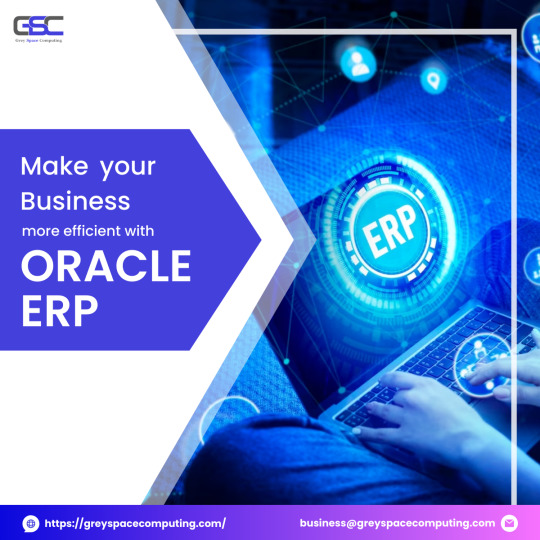
Make your business more efficient with Oracle ERP!
🌐✨ Seamlessly integrate, innovate, and watch your business soar to new heights. Embrace the power of efficiency, because your success deserves the best! 💼💖
🌐 Website: https://greyspacecomputing.com/oracle-erp-solution/
📧 Email: [email protected]
📱 Phone: +91-98602 56990
#OracleERP #Greyspacecomputing #oracleerp #cloudsolutions #clouderp #cloudapplications #oraclepartnerindonesia #oraclepartner #odi #optimadatainternasional #equinetechnologiesgroup #odilife #oracleodi #oracleerpcloud #oraclehcm #oraclehcmcloud #oracleapplicationspartner #oraclecx #worklifeinodi #oraclecxcloud #reater #workato #accounting #technology #erpcloud #oracle #erp #innovation #transformation
#Make your business more efficient with Oracle ERP#oracle erp for business#erp for business#dubai#saudi#saudi arabia
1 note
·
View note
Text
5 Tips to Choose the Right ERP for Your Business
In today's fast-paced and highly competitive business landscape, choosing the right Enterprise Resource Planning (ERP) system is crucial. ERP software can help streamline operations, improve efficiency, and ultimately contribute to business growth. However, selecting the most suitable ERP solution can be a daunting task. To help you make an informed decision, we've compiled five essential tips to guide you in choosing the right ERP for your business.
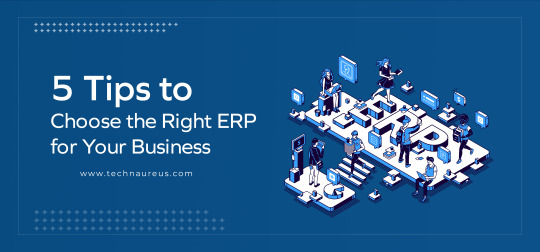
Tip 1: Define Your Business Needs
The first and most crucial step in selecting the right ERP system is to define your business needs. Every organization is unique, and your ERP should cater to your specific requirements. Start by identifying the challenges your business faces and the goals you aim to achieve with an ERP. Engage key stakeholders from different departments to ensure all aspects of your operations are considered. A clear understanding of your needs will serve as a solid foundation for the rest of the selection process.
Tip 2: Research and Compare ERP Solutions
Once you've identified your business needs, it's time to research and compare ERP solutions. There is a wide range of ERP vendors and systems available, each with its own set of features and capabilities. Take the time to evaluate different options, considering factors like industry-specific solutions, scalability, and integration capabilities. This phase is critical because it will help you narrow down your choices and find the ERP system that aligns best with your business goals.
Tip 3: Consider Cloud vs. On-Premises ERP
One of the significant decisions you'll face is choosing between cloud-based and on-premises ERP solutions. Each has its advantages and drawbacks. Cloud-based ERPs are known for their accessibility, scalability, and cost-effectiveness, while on-premises solutions offer more control and security. Consider your budget, IT infrastructure, and long-term objectives when making this decision. It's also important to evaluate the data security and compliance requirements specific to your industry.
Tip 4: Evaluate Vendor Reputation and Support
The reputation and support provided by the ERP vendor are crucial factors. Look for vendors with a track record of successful implementations and satisfied customers. It's not just about the software; it's about the ongoing support and partnership. Ensure the vendor provides comprehensive training, regular updates, and responsive customer support. Check for case studies and references to get insights into the vendor's previous work and their commitment to customer satisfaction.
Tip 5: Plan for Implementation and Customization
Choosing the right ERP system is just the beginning. Planning for successful implementation and customization is equally important. Create a clear strategy for the ERP rollout, involving all relevant stakeholders. Employee buy-in and adequate training are essential for a smooth transition. Consider the level of customization the ERP system allows to tailor it to your specific needs. An effective implementation plan will ensure that your business can fully leverage the ERP's potential.
Conclusion
Selecting the right ERP for your business is a pivotal decision that can shape your organization's future. By following these five tips, you can navigate the ERP selection process with confidence. Remember that your choice should align with your business needs, vendor reputation, and support, and be well-planned for successful implementation. A well-chosen ERP system can be a game-changer for your business, optimizing operations and driving growth.
If you're looking for expert guidance in choosing the right ERP for your business, feel free to reach out to us. Our team is here to assist you in making the best choice for your unique needs and objectives.
#odoo#odooerp#teamtechnaureus#catchw8#odoo17#technology#erp for business#odoo erp#erp#business solutions#erpsoftware#erp implementation#erp systems#erp software uae#erp solution#erpandcrmdevelopment#appdevelopment#softwaredevelopment#software#automation
0 notes
Text

disappears for weeks posts this disappears again
#ninjago#aphid’s ninjashits#jaya#ninjago jaya#jaya ninjago#nya jiang#nya smith#nya ninjago#jay walker#jay ninjago#im just busy w college review lel#and idv…#still on that ninjago life though#the original is somewhere on twitter but i lost it erps#this is so stupid
2K notes
·
View notes
Photo

Aara Technologies provide the best ERP software solution that helps the organization integrate all data and processes into a single unified system. In our ERP systems, we use a single unified database to store data for the various system modules. Our ERP software solution(ERP software development company in India) is web-based and it allows facilitates the organization or firms have to real-time access to the system.
0 notes
Text
Connect Odoo with Tableau Desktop
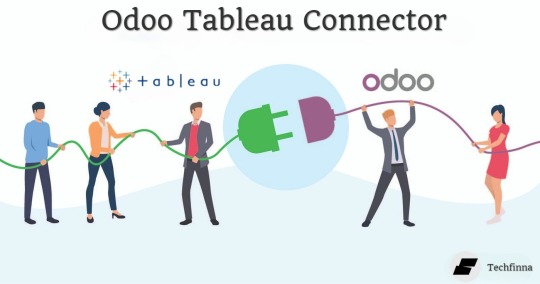
The Techfinna Odoo Tableau Connector is a integration tool that connects Odoo with Tableau, enabling real-time data extraction and visualization. With features like custom table selection, automatic schema detection, and support for live data refresh, it simplifies the process of creating dynamic dashboards and reports. This connector empowers businesses to unlock deeper insights and make data-driven decisions efficiently.
#odoo #odooerp #odoosoftware #odoomodule #crm #accounting #salesforce #connector #integration #odoo18 #odoo17 #microsoft #powerbi #desktop #odoo services#odooimplementation#google#odoo development company#odoo crm#microsoft#odoo erp#odoo#good omens
#odoo erp#odoo18#odooimplementation#odoo development company#odoo services#analytics#innovation#cybersecurity#tableau#advanced#odoo#business
8 notes
·
View notes
Text
Online Classified Ads: A Classic Example of C2C E-Commerce
The Power of Online Classified Ads in C2C E-Commerce

In today’s digital era, e-commerce has redefined how individuals and businesses interact, creating seamless connections between buyers and sellers. A shining example of this transformation is the rise of C2C (Consumer-to-Consumer) e-commerce, with online classified ads leading the charge. Platforms like Craigslist, OLX, and Facebook Marketplace have revolutionized the traditional marketplace by making transactions faster, more convenient, and globally accessible.
Let’s explore how online classified ads exemplify C2C e-commerce, the technology behind their success, and the significant role they play in shaping the digital economy.
What is C2C E-Commerce?
C2C e-commerce, or consumer-to-consumer electronic commerce, facilitates direct transactions between individual buyers and sellers using third-party platforms. Unlike B2C (Business-to-Consumer) or B2B (Business-to-Business) models, C2C focuses entirely on connecting consumers for transactions without a middleman business.
Online classified ads are the backbone of C2C e-commerce, acting as digital hubs where users list products and services for sale. Other users can then browse, negotiate, and purchase directly from the seller.
Why Online Classified Ads Are Ideal for C2C E-Commerce
1. Direct Consumer Interaction Classified platforms prioritize direct communication between buyers and sellers. This immediate interaction fosters trust and simplifies decision-making, making transactions quicker and more personal.
2. Low or Zero Transaction Costs Most platforms allow users to post ads for free or charge minimal fees. This affordability encourages individuals to sell items and services, creating a thriving marketplace.
3. Diverse Offerings From second-hand furniture and electronics to rental properties and job postings, online classifieds cover a broad spectrum of categories, catering to a wide range of consumer needs.
4. Global and Local Reach Users can choose between targeting local buyers for quick sales or reaching a global audience for niche products, making these platforms highly versatile.
5. User-Friendly Platforms Designed to be simple and intuitive, classified sites are accessible to users of all skill levels, enabling easy posting, browsing, and communication.
The Technology Behind Online Classified Platforms
The success of online classified ads lies in the sophisticated technologies powering these platforms:
Advanced Search Algorithms: These ensure users quickly find relevant listings based on location, category, and price.
Secure Payment Gateways: Many platforms integrate secure payment options to safeguard transactions.
Responsive Web Design: Classified platforms are optimized for mobile devices, ensuring consistent user experiences across screens.
AI-Powered Recommendations: Artificial intelligence offers personalized suggestions based on user preferences and browsing behavior.
SEO and Analytics: Platforms leverage SEO to boost the visibility of listings on search engines and use analytics to understand and enhance user engagement.
Benefits of Online Classified Ads in C2C E-Commerce
1. Empowering Small Sellers Classified ads provide a level playing field for individuals and small businesses to reach buyers without requiring a physical storefront.
2. Promoting Sustainability By encouraging the resale of second-hand goods, these platforms reduce waste and contribute to a circular economy.
3. Faster Transactions With features like instant messaging and real-time notifications, classified platforms streamline communication and accelerate deals.
4. Cost-Effective Marketing Sellers can create impactful ads with photos and detailed descriptions without needing expensive marketing campaigns.
Challenges in C2C E-Commerce via Classified Ads
Despite their advantages, online classifieds face challenges:
Trust Issues: Buyers may worry about product quality, payment security, or fraudulent listings.
Minimal Regulation: Without strict oversight, issues like spam, counterfeit goods, and misleading ads may arise.
High Competition: The abundance of listings can make it hard for sellers to stand out without investing in premium placements.
Logistics: Delivery is often left to buyers and sellers, complicating transactions for bulky or long-distance items.
How Online Classified Ads Drive C2C E-Commerce Growth
Despite these obstacles, classified platforms remain pivotal in the growth of C2C e-commerce for several reasons:
Democratization of Commerce: They empower anyone with internet access to participate in the marketplace.
Innovative Monetization: Features like promoted ads and premium listings offer additional value to users while generating revenue for platforms.
Community Building: By fostering local transactions and encouraging user feedback, classified platforms create engaged communities.
Optimizing Classified Listings with SEO
For sellers, SEO (Search Engine Optimization) is essential to boost visibility on classified platforms. Including relevant keywords like “buy and sell locally,” “best deals online,” or “affordable used goods” can significantly enhance listing performance.
Companies like KSoft Technologies specialize in web development, SEO strategies, and digital marketing, helping classified platforms and individual sellers achieve:
Higher rankings on search engines.
Enhanced user interfaces for better engagement.
Scalable and secure technology solutions.
The Future of Online Classified Ads in C2C E-Commerce
The future of online classifieds is bright, with innovations in AI, blockchain, and logistics solutions promising to address current challenges. These advancements can enhance trust, security, and overall user experiences, ensuring the continued growth of C2C e-commerce.
As technology evolves, businesses offering web development, mobile app development, and SEO services, such as KSoft Technologies, will play a vital role in empowering classified platforms to stay competitive and innovative.
Conclusion
Online classified ads are a cornerstone of C2C e-commerce, creating spaces for direct consumer interaction, affordable transactions, and sustainable commerce. By connecting buyers and sellers without traditional barriers, these platforms exemplify the potential of technology-driven marketplaces.
Whether you're looking to improve your classified platform or enhance your digital presence, KSoft Technologies offers cutting-edge solutions in web development, mobile app creation, and SEO strategies to help you thrive.
Visit KSoft Technologies today and discover how we can help elevate your business in the evolving digital economy! 🚀
#business to business#ecommerce#branding#artificial intelligence#web design#web development#seo services#techinnovation#economy#erp software#entrepreneur#adobe#technews#computer#technology
3 notes
·
View notes
Text

Unlock your business potential with custom Odoo development. From streamlined processes to enhanced user experience, we build solutions that fit your unique needs.
#odoo#erp#odooerp#software#accounting#business#erpsoftware#odoodevelopment#odoopartner#crm#odooapps#erpsolutions#iwesabe#odoointegration#pos#odooimplementation#erpsystem#management#erpsolution#clouderp#bisnis#accountant#manager#odoocustomization#finance#leukeun#outsourcing#technology#ecommerce#website
2 notes
·
View notes
Text
Top 10 ERP software provider in India | shantitechnology
STERP (shantitechnology) is a leading ERP solution provider in Pune, delivering industry-focused ERP for manufacturing companies in Pune. As one of the top 10 ERP software providers in India, we specialize in streamlining operations with cutting-edge manufacturing ERP software in Pune. Trusted among the best ERP software providers in Pune, we empower businesses with seamless automation and efficiency.
Choose STERP – one of the most reliable ERP software companies in Pune for unmatched enterprise solutions!
#ERP for manufacturing company in Pune#Manufacturing ERP software in Pune#ERP solution providers in Pune#India#ERP software providers in Pune#Pune#Mumbai#Maharashtra#ERP software companies in Pune#Top 10 ERP software provider in India#ERP solution#ERP software#Cloud ERP#Business Solution#MSME#SME#business analyst#business analysis#ERP software provider
5 notes
·
View notes
Text
Microsoft Dynamics 365 Finance & Operations Partner | D365 Finance Software | JRS Dynamics Info Solutions
Streamline your financial and operational processes with Microsoft Dynamics 365 Finance & Operations, delivered by JRS Dynamics – a trusted D365 consultant in India and USA!
Why Choose JRS Dynamics for Dynamics 365 Finance?
✅ Expert Implementation ✅ Comprehensive Consulting & Support ✅ Global Reach ✅ Industry-Specific Customizations
Empower your business with advanced financial tools, real-time analytics, and streamlined operations.
Learn more about our services at: https://jrsdynamics.com/consultation-finance-and-operations/
Partner with JRS Dynamics to optimize your business with Microsoft Dynamics 365 Finance & Operations.
#financeandoperations#finance#business#ERP Software Company#Software Development Company#it solutions#it services#digitaltransformation#microsoftdynamics365#businessmanagement#businesssuccess#jrsdynamics
2 notes
·
View notes
Text
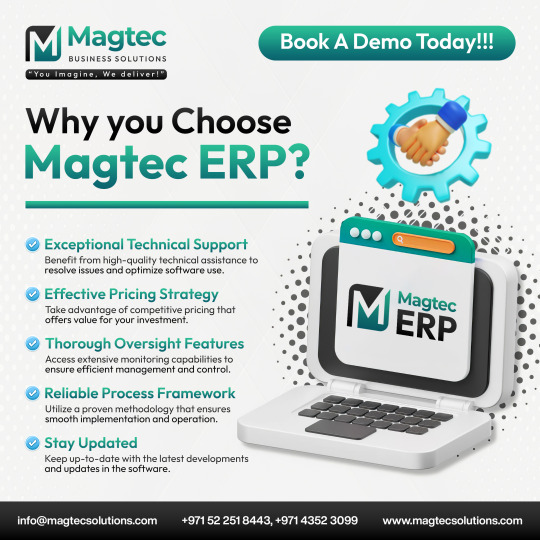
Streamline your business operations with Magtec ERP! 🚀 We offer exceptional technical support, competitive pricing, thorough oversight features, a reliable process framework, and stay up-to-date with the latest software developments. 💻 Book a demo today and see how Magtec ERP can transform your business! ✨
#magtec#erp#automation#business#efficiency#software#technology#innovation#digitaltransformation#enterprise#solutions#productivity#success#growth#management#finance#humanresources#supplychain#logistics#cloud#saas#onpremises#hybrid#integration#scalability#customization#support#trustedpartner#magtecerp#magtecsolutions
2 notes
·
View notes
Text
Connect or integrate Odoo ERP database with Microsoft Excel

Techfinna's Odoo Excel Connector is a powerful tool that integrates Odoo data with Microsoft Excel. It enables users to pull real-time data, perform advanced analysis, and create dynamic reports directly in Excel. With its user-friendly interface and robust functionality, it simplifies complex workflows, saving time and enhancing productivity.
#odoo #odooerp #odoosoftware #odoomodule #crm #accounting #salesforce #connector #integration #odoo18 #odoo17 #erpsoftware #odoodevelopers #odoocustomization #erpimplementation #lookerstudio #odoo18 #odoo17
#odoo#odoo company#odoo erp#odoo services#odoo software#odoo web development#good omens#odoo crm#odoo development company#odoo18#microsoft#excel#ms excel#odoointegration#analytics#odoopartner#odooimplementation#innovation#business#customersatisfaction#cybersecurity
5 notes
·
View notes
Text
#Dedicated server hosting for ERP#Best dedicated server for business ERP#High-performance dedicated server for ERP
2 notes
·
View notes
Text
Let's look back & see the effects of past on the future of ERP.
2 notes
·
View notes
Text
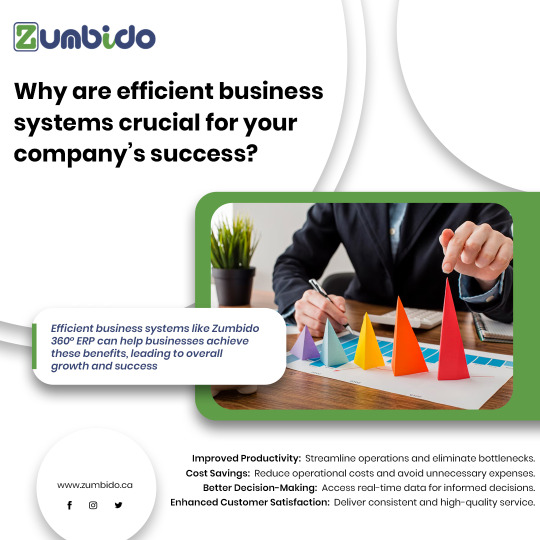
3 notes
·
View notes
Text
ERP Software Development
In today’s fast-paced business environment, efficiency and precision are paramount. One of the most effective ways to achieve this is through the use of ERP Software.
#software development#appdevelopmentcompany#software#erp software#erp solution#softwaredevelopment#erp for small business#business
3 notes
·
View notes